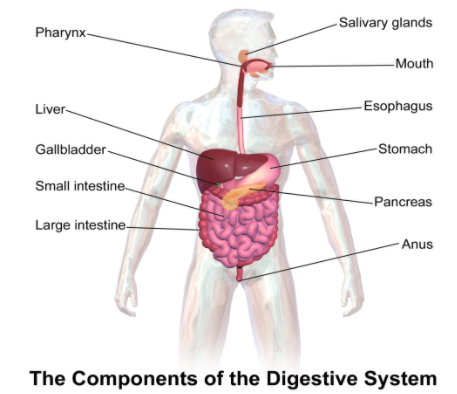
Define the term digestion.
Answer
565.2k+ views
Hint: The important physiological processes in human beings are respiration, digestion, excretion etc. Digestion is important because the human body needs nutrients to sustain a healthier life and it should come from food.
Complete answer:
Digestion refers to the splitting up of food into smaller components. It can be easily absorbed into the bloodstream. This digestion is divided mainly into two types: the mechanical digestion of food that occurs in the mouth when it is broken down into smaller pieces. The chemical digestion occurs in the gastrointestinal tract when the food is broken down into small molecules by the digestive enzymes.
The initial digestion of food is taking place in the mouth where it comes in contact with salivary amylase or ptyalin.
After the breakdown from the mouth food then travels down the food pipe or to the oesophagus to reach the stomach where gastric juices start to breakdown the protein in the food. The gastric juice mainly contains pepsin and HCL (hydrochloric acid).
The acids present in the stomach helps in the denaturation of the proteins present in food. Along with this chemical digestion further mechanical digestion is also occurring through peristalsis, which is a process by which the muscles in the stomach wall contract to mix the food and digestive enzymes.
The food stays in the stomach for around an hour or two and then passes into the small intestine. In the small intestine numerous enzymes are released to further break down the food components. The walls of the small intestine contain projections called villi and microvilli and it provides a large surface area for the transmission of digested food molecules into the blood vessels of the intestinal wall.
The liver and pancreas are the other two organs that play important roles in digestion. The liver produces the bile which is required for digestion which is carried into the small intestine by the bile duct. Pancreas secretes the pancreatic juices that also support digestion and nutrient absorption.
After passing into the small intestine food moves into the large intestine and from there absorption of the remaining nutrients and water occurs. The resultant fecal material is stored in the rectum from where it passes out of the body by defecation.

Note: Enzymes which are involved in digestion include salivary amylase, HCl, pepsin, rennin, bile, pancreatic juices which include trypsinogen, chymotrypsinogen, procarboxypeptidase, phospholipase, elastase, Isotonic fluid secreted from the glands of intestine.
Complete answer:
Digestion refers to the splitting up of food into smaller components. It can be easily absorbed into the bloodstream. This digestion is divided mainly into two types: the mechanical digestion of food that occurs in the mouth when it is broken down into smaller pieces. The chemical digestion occurs in the gastrointestinal tract when the food is broken down into small molecules by the digestive enzymes.
The initial digestion of food is taking place in the mouth where it comes in contact with salivary amylase or ptyalin.
After the breakdown from the mouth food then travels down the food pipe or to the oesophagus to reach the stomach where gastric juices start to breakdown the protein in the food. The gastric juice mainly contains pepsin and HCL (hydrochloric acid).
The acids present in the stomach helps in the denaturation of the proteins present in food. Along with this chemical digestion further mechanical digestion is also occurring through peristalsis, which is a process by which the muscles in the stomach wall contract to mix the food and digestive enzymes.
The food stays in the stomach for around an hour or two and then passes into the small intestine. In the small intestine numerous enzymes are released to further break down the food components. The walls of the small intestine contain projections called villi and microvilli and it provides a large surface area for the transmission of digested food molecules into the blood vessels of the intestinal wall.
The liver and pancreas are the other two organs that play important roles in digestion. The liver produces the bile which is required for digestion which is carried into the small intestine by the bile duct. Pancreas secretes the pancreatic juices that also support digestion and nutrient absorption.
After passing into the small intestine food moves into the large intestine and from there absorption of the remaining nutrients and water occurs. The resultant fecal material is stored in the rectum from where it passes out of the body by defecation.

Note: Enzymes which are involved in digestion include salivary amylase, HCl, pepsin, rennin, bile, pancreatic juices which include trypsinogen, chymotrypsinogen, procarboxypeptidase, phospholipase, elastase, Isotonic fluid secreted from the glands of intestine.
Recently Updated Pages
Master Class 12 Economics: Engaging Questions & Answers for Success

Master Class 12 Physics: Engaging Questions & Answers for Success

Master Class 12 English: Engaging Questions & Answers for Success

Master Class 12 Social Science: Engaging Questions & Answers for Success

Master Class 12 Maths: Engaging Questions & Answers for Success

Master Class 12 Business Studies: Engaging Questions & Answers for Success

Trending doubts
Which are the Top 10 Largest Countries of the World?

What are the major means of transport Explain each class 12 social science CBSE

Draw a labelled sketch of the human eye class 12 physics CBSE

Why cannot DNA pass through cell membranes class 12 biology CBSE

Differentiate between insitu conservation and exsitu class 12 biology CBSE

Draw a neat and well labeled diagram of TS of ovary class 12 biology CBSE




